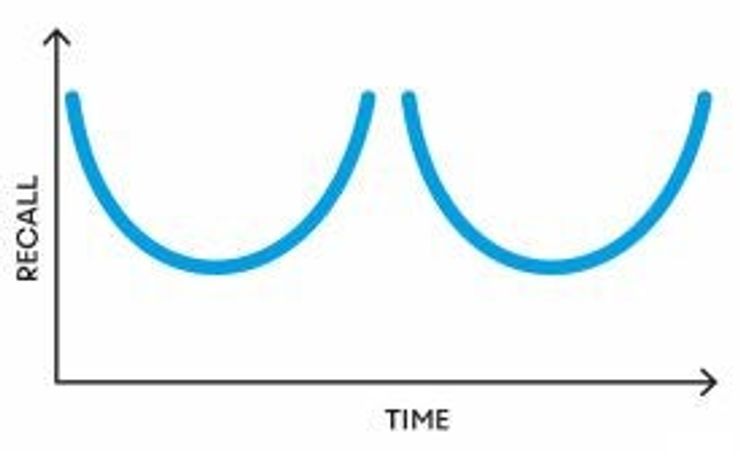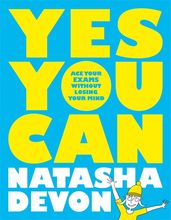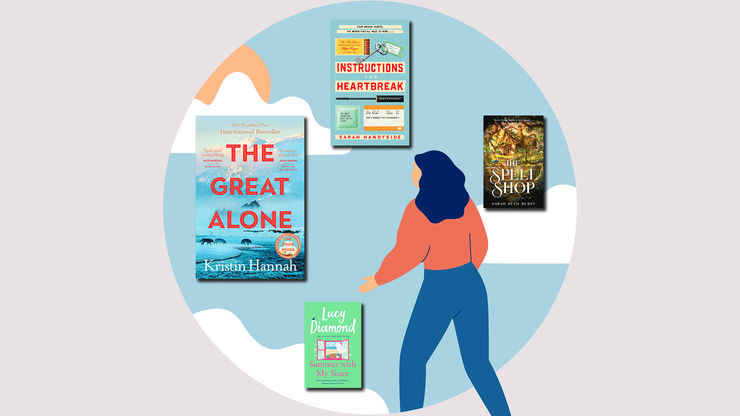Tips and tricks to study at home for 13 to 18-year-olds
If you, or the teenagers in your life, are finding homeschooling tough right now, Natasha Devon is here to help with these home study motivation tips.

Teenagers across the country are struggling with homeschooling right now, and with everything that’s going on in the world, it’s not surprising that many are finding it difficult to keep their minds on their schoolwork. Writer, presenter and activist Natasha Devon is here to help with these tips for understanding how to motivate yourself to study at home, adapted from her book Yes You Can: Ace Your Exams without Losing Your Mind.

In 2020, schools and colleges throughout the world went into lockdown as a result of the global pandemic. For millions of young people who had been used to learning in a classroom, that meant trying to do their work from their bedrooms or kitchen tables, often alongside parents who were also trying to work from home.
‘No one taught me how to learn like this,’ teenagers told me, as they lamented the loss of friends, school equipment and three-dimensional teachers.
Learning to motivate yourself isn’t easy, but it is an essential life skill. It’ll not only come in handy when you go on study leave pre-exams, but it will serve you in the future, too: evidence shows more of today’s school pupils will work from home as adults, at least part of the time.
This resource aims to give you some simple tips to help you rise to the challenge. They’ll not only help you if you aren’t able to go into school or college right now, but will help you understand what drives and inspires you.
Quiz: Are you a procrastinator?
For each set of three statements below, choose the one which most applies to you:
Statement 1:
A: I can take a while to get motivated to work, but once the juices are flowing I find it easy to get stuck in.
B: I find it easier to do something I’m dreading if I can ‘reward’ myself afterwards.
C: I can put off getting started on a project forever and often don’t give myself enough time to do it properly.
Statement 2:
A: Having an impending deadline motivates me to work – some of my best essays have been pulled out of the bag at the eleventh hour.
B: Deadlines don’t really mean that much to me, I’d rather get everything I have to do done as soon as possible, and then be free to live my life.
C: Having an impending deadline panics me to the extent I can’t think straight and waste lots of time stressing.
Statement 3:
A: I find I get more energy and enthusiasm to study as I go along.
B: My favourite bit of studying is when it is OVER.
C: Sometimes I spend so long planning my study I don’t have time to actually do it.
Statement 4:
A: I stop studying when the section I’ve set myself is done, no matter how long that takes.
B: I stop studying when I get bored.
C: I stop studying when I’m so tired I fall asleep
Mostly A’s: You’re generally quite self-motivated and tend to enjoy studying just for the joy of knowing stuff. It’s probably a good idea for you to start with a subject you enjoy to get yourself into the right headspace, but make sure you limit the time you spend on that and incorporate a subject you’re dreading, or behind on, in each session.
You’re also at the highest risk of burnout from overworking, so take extra care to schedule in the activities which keep you well, like exercise, relaxation or creative hobbies. Try also giving yourself one study-free day per week.
Mostly B’s: Your motto is ‘but how is this relevant to my life, though?’ Whilst you’re probably very bright, you often can’t see the point of studying and would much rather learn by being out in the ‘real’ world, living.
You probably have quite a short attention span and are therefore in danger of letting your studies slide. The key for you will be discovering your ‘driving force’ (see later section) and giving yourself rewards after each session of study. Make sure you start with a subject you dislike, or are behind on, then progress to the topics you love later in your study session.
Mostly C’s: You are an epic procrastinator! You are an epic procrastinator!
Your biggest challenge is getting over your fear of failure and realising you don’t have to do everything at once. Adopt the mottos ‘any action is progress’ and the old Italian proverb ‘don’t let the perfect be the enemy of the good.’ Challenge yourself to just write or learn one paragraph. You’ll probably find by the time you get to the end, you’ll want to do more.
Hardly anything is as terrible in real life as it is in our imaginations, so try a subject you hate first. Remember, it’s just one paragraph/practice question.
What is your driving force?
Your driving force is the reason you get out of bed in the morning. By which I mean not the alarm of your phone, but the thing that puts fire in your belly and makes life worth living.
People who know what their driving force is not only tend to give their work their full attention and therefore achieve more, they’re also generally happier. Pretty much as soon as we are born, society aggressively tells us what we should be striving for: To make lots of money to buy lots of things to show off. Yet the fact is having stuff doesn’t make you happy. Briefly euphoric, yes, but not truly contented.
If you allow your environment to dictate your motivations, you’ll inevitably end up resenting working because your life doesn’t really inspire you. Say, for example, your driving force is freedom but you haven’t taken the trouble to work that out. You’re offered a job with a high salary and long hours and you think ‘this is what success looks like, I should take it.’ After a few months of never seeing daylight because you’re trapped in the office, you’re going to end up very dissatisfied, no matter how many zeros are in your pay packet.
Superficial reward
A ‘superficial reward’ is anything that happens at the end of an achievement but doesn’t serve your driving force. For example, money, likes on social media or grades.
Discovering your driving force
There are a few ways you can discover your driving force:
What’s your biggest value?Think of a time when you were incandescent with rage over something which was, objectively, not that important.
We’ve all been in a situation where our friends are like ‘will you STOP going on about such-and-such, it’s been three weeks and it didn’t matter that much to begin with!’ When that happens, the chances are whatever happened violated your biggest value. Incidents which breach our values don’t have to be objectively significant in order to have a profound impact on us, psychologically.
For example, I was once talking about this to a group of year tens and asked if anyone could tell me about a time they overreacted to something. One of the students gave me what is still my favourite anecdote about value violation, if only because the way she told it was hilarious:
She’d walked into town after school with her best friend, excited because she had some cash on her (usually she had packed lunch so didn’t bring any money into school, but on this occasion, for some reason, she was buying school lunch, had been given £5 and only spent half of it). After some deliberation, she decided to spend her remaining £2.50 on one of those giant, soft cookies you buy from carts at train stations.
She spent ages selecting her flavour and said she could still remember the feeling of the warmth from the cookie seeping through the bag as she hurried towards a park bench where she could sit down and devour it. She told her friend so. In fact, she told me about the cookie in quite a lot of reverent detail so we can assume it was a major topic of conversation at the time.
At this point, for no reason whatsoever that she could fathom, her friend decided to stick her leg out, deliberately trip her up so she fell over and dropped her cookie in a puddle. Her friend then proceeded to apologise and claim she didn’t know why she did it, all the while pissing herself laughing.
Our heroine was so upset she turned her back on her friend and ‘marched’ all the way home in a fit of strop. That I’d say, is understandable in the circumstances. What followed wouldn’t have been out of place as a Hollyoaks storyline. Her friend spent the evening furiously WhatsApping, calling and private messaging her to apologise. She refused to respond. The next day, her friend bought her in a replacement cookie and she threw it in the bin. In the end, she blanked her – lest we forget – BEST friend for three days and, she told me, ‘I don’t really understand why because, at the end of the day, it was a biscuit’.
It wasn’t just a biscuit, though. It was what the biscuit represented. The incident had made our heroine feel daft and had broken a bond of trust. Above all, however, it was unfair. Fairness is a key value for some people (and in this particular instance the student in question was a keen campaigner and vocal member of the student council, motivated by wanting to make the world a fairer place).
If fairness motivates you then, whatever form your work takes, it must somehow contribute to achieving justice.
What are your desert island objects?
If you were stranded on a desert island and could only pick three objects to take, what would they be?
Now, think about what object represents – chances are, it’s a key motivator for you.
For example, lots of people say ‘my phone’ when I ask them this question. Yet a phone wouldn’t get signal on a desert island and logically most people know that. So what does your phone represent to you? For many people, it’s connection – the feeling of being constantly plugged into a community.
Belonging is a key psychological human need, so it’s little wonder so many of us feel attached to our tribe, whether it’s online or IRL. Yet so many of us conduct our study in solitude – little wonder, then, that we dread it.
What’s your happiest memory?
Think of the time when you felt most contented. What was happening? Is there anything you can identify as being significant? For example – were you/had you just been on stage? For most people, being on stage is literally the stuff of nightmares, but a certain percentage have a ‘performers’ mentality.’ This means you are driven by the acquiring of attention. HANG ON A MINUTE I hear you cry DOESN’T THAT MAKE ME THE AMONGST THE WORST, MOST ANNOYING PEOPLE ON THE PLANET? Not necessarily (see ‘don’t be ashamed of your driving force,’ below).
The most common driving forces
Your driving is unique to you. Having said that, there are some common themes and I’ve listed these below:
Fairness/Justice – Famous example: Malala Yousafzai
Socialising/Understanding people/Community – Famous example: Oprah Winfrey
Freedom/Independence – Famous example: Bear Grylls
Making a difference – Famous example: Martin Luther King
Attention – Famous example: Beyoncé
Competition – Famous example: Usain Bolt
Write down any that apply to you and then try to whittle it down to one that you consider the most important.
Try not to be ashamed of driving force
‘Attention seeker’ is a common insult I hear flung around in schools and, whilst I don’t agree it’s a helpful label, I understand why. ‘Look at meeeee!’ people can be incredibly annoying.
It’s difficult to change what drives you. You can, however, make choices about how you channel your driving force.
Making revision match your driving force
My mum still talks about my obsession with Cardinal Wolsey when I was doing my A-Levels. Legend has it that I used to talk to her about him through the crack in the bathroom door whilst she was trying to have a relaxing bath (I neither confirm nor deny the truth of this).
For those unfamiliar, Cardinal Wolsey was a close advisor to Henry VIII. In true Henry VIII style, when Cardinal Wolsey had outlived his usefulness he was executed, having been tried on almost totally fabricated charges. I read outside the required reading on the Tudors, just because I wanted to understand WHY. What were the flaws in the legal system which allowed Henry VIII to get away with such behaviour? What was Wolsey’s legacy? Was any kind of relationship with a monarch back then a Faustian pact?
Yep, you guessed it, the story of Cardinal Wolsey had (unbeknownst to me at the time) played into my driving force, which is fairness.
If you can see the ways in which your study matches your pre-existing internal compass, you’ll always find it interesting, if only in a ‘means to an end’ type way. For example, you might be really into philosophy, but not so much maths. Yet the universe is made up of numbers and people who study theoretical physics (i.e. really, really fancy maths) are the closest to understanding the secrets of the universe. Maths might help you discover the meaning of life (and if it does please email me and tell me what it is).
Here are some other ways to make your study time match your driving force:
I’m a people person

If your driving force is being sociable, it makes sense to study in groups. Social distancing makes this harder but not impossible. Get everyone on a digital platform, or email each other quizzes you’ve designed on the subject material.
I want to make a difference

Is there someone in your friendship group who struggles with a subject you enjoy? Help them with their revision – you’re also going over the subject matter, and explaining it to someone else is a great way of helping you remember it.
Look at me, please

Teaching is a type of performing. So prepare a ‘class’ on your chosen topic and present it to your friends via a digital platform. Make it funny and entertaining – it’ll help both them and you retain the information.
I’m competitive

Start a competition with yourself. Get hold of a mock or past paper online and time yourself answering questions. Log your times and see if you can beat them. Grade yourself and track your improvements on a chart (competitive people LOVE charts).
Study tips – making studying in one location more interesting
Incorporate as many of the five senses as you can into revision
Mind maps use a combination of images and words in a colourful spider-diagram type format to summarise key information. They work because when you read a word your brain ‘hears it’. Words are therefore an audio, as opposed to a visual, cue. By using images and colours, we give the brain more than one metaphorical ‘peg’ on which to hang the information and are therefore able to recall it more easily.
Some people swear by using smell to similar effect. Try putting a distinct brand of body spray or perfume on whilst studying, or apply a few drops of essential oil to a piece of toilet roll or hanky – use a different one for each subject.
Tell stories
The human brain LOVES a narrative. We are a species of storytellers and, throughout our evolution, this was how tribal elders passed down vital information to their children and grandchildren, which would allow them to survive and flourish.
We’re therefore wired to remember information more easily if it’s in the form of a story. It doesn’t have to be particularly sophisticated.
Sing it
You know how you can remember all the lyrics to a song you don’t even particularly like, but mathematical formulas just won’t stay in your head in the same way (annoyingly)? It’s because tunes help us remember words. Put a melody to whatever you’re studying. Make it a song you already know and that way you, if you find yourself going blank the next day, you can hum it to remind yourself what you were doing.
Put reminders in unexpected locations
Write notes or select images from your mindmaps on post-its and put them in places your brain doesn’t associate with studying, like the bathroom mirror and the fridge door. Your mind’s capacity for thought is 90% unconscious which means even if you don’t actively register them, you’ll still absorb them instinctually as you pass them each day.
Make your study look like boobs

Your recall is highest at the beginning and end of any one period of concentration. Let’s say you had an hour to study – that means your ability to focus would peak for the first and last few minutes of that hour. If drawn, your concentration would look like this.

If, however, you choose to divide the hour into two shorter periods of 25 minutes with a ten-minute break in between, you double the amount of time your recall peaks, meaning you recall more information. In this instance, your concentration looks like boobs!
There’s a balance to be struck here since we know constant interruptions cause you to ‘drop’ the intellectual balls you’re juggling and interfere with your ability to focus. A reasonable goal would be to ensure you spend half an hour – which you can divide into breaks of ten or twenty minutes – away from your books during any one period of study.
The ultimate aim is to spend those ten or twenty-minute breaks doing endorphin-releasing activities which release cortisol and adrenaline from the system and restore chemical balance, like physical activity, stretching, laughing, listening to music or doing a mindfulness activity– that way, you’re not only optimising your ability to study but also improving your mental fitness simultaneously: WIN.

Activity sheet - How to motivate yourself to study at home - Yes You Can - Natasha Devon
Yes You Can: Ace Your Exams Without Losing Your Mind

Natasha Devon is here to help you ace your exams in this inspiring and empowering guide. Natasha will show you how to stay calm in the face of exams by teaching you how your brain works, how to plan your study breaks and how to deal with exam days. Revolutionize the way you revise.
Explore the best young adult fiction for coming-of-age reads.


